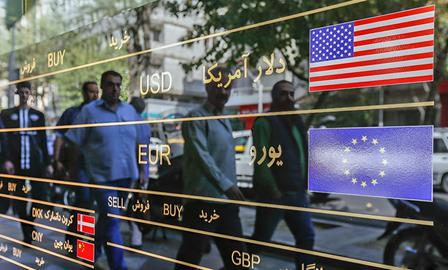Following Iran’s July 2015 agreement with the US and five other world powers over its nuclear program, Iran is set receive substantial sanctions relief that will significantly ease its ability to do business with other countries.
Foreign investors are already exploring new opportunities, and gauging the risks of doing business in Iran.
Bijan Khajehpour is a managing partner at Atieh International, the Vienna-based international arm of a group of strategic consulting firms based in Tehran.
He spoke to IranWire about the post-deal investment scene.
How has this year’s nuclear agreement changed prospects for foreigners wishing to invest in Iran?
It has definitely improved prospects. Once sanctions are lifted, companies can decide more freely about investing and trading in Iran. It could enormously improve the situation of European companies, which will probably benefit most in terms of sanctions being lifted and legal obstacles being removed. There is a new and more optimistic scene for investors.
Which areas of the Iranian economy will investors find most attractive?
Iran is generally a very attractive destination for investors because it has enormous natural resources, and very educated, ready-to-engage human resources. If you add to that the domestic market of about 80 million people, plus all the regional potential that comes with it, and the fact that Iran borders on so many countries, so many emerging markets, the combination of factors makes it very attractive.
We will see a lot of investor activity in sectors where natural resources are overwhelmingly strong, such as oil and gas, and in some other sectors where the market itself is very big, like telecoms, or industrial products such as steel and cement, and also the automotive industry.
What risks and obstacles might foreign investors face in Iran, which they wouldn’t necessarily face in other countries?
Risks exist in all countries. What’s important to understand is that even without sanctions, there are some issues relating, for example, to the legal framework in Iran for investment, and the presence of foreign companies. A general fact about Iran is that laws and regulations tend to be ambiguous, and that may become a risk for some investors.
There are sometimes operational risks in Iran, in the sense of projects being delayed because of project management issues, or because of operational bottlenecks. There are bureaucratic issues. There are issues in the business and investment climate in general that will definitely hit foreign investors or foreign companies who are active in Iran. None of these risks are unique to Iran though. They exist for all companies investing in emerging markets or developing countries.
Another risk that needs to be mentioned is the spillover security risk from Iran’s neighbors, including Afghanistan and Iraq, and from other regional developments. If you have a project in one of the border regions you would have to take security into account. But compared to other markets, Iran is a safe country.
What about the recurring questions of copyright and corruption?
Copyright is definitely an issue. Iran has patent rights, and intellectual property can be registered in Iran according to Iranian law. There are quite a number of laws that protect intellectual property but it is not the most advanced legal framework. Here I would advise international investors to seek legal advice, and to develop a strategy on how they are going to manage their legal issues.
There is corruption. That is not a secret. Even the Iranian government has admitted that there is corruption. It is a big challenge for the government. Corruption spread widely during the Ahmadinejad years. The Rouhani government is addressing the issue through legal and structural reforms. There have also been very public legal cases against corrupt officials and bank managers. However, the true process of fighting corruption in Iran will require political, structural and legal reforms. It will be a long process.
How are Iran’s political factions reacting to the prospect of renewed foreign investment?
The government, and the more moderate political forces, are very much in favor of foreign investment in Iran. Today it is evident that key political stakeholders wish to see more and more value-added activities and value creation in Iran. So they are asking foreign companies to come and start joint ventures with Iranian companies. There is definitely, on the more moderate side, a welcoming attitude, but one that says, “We don't want to see companies just exporting products to Iran, we want them to come and invest in Iran, we want them to create joint ventures and add value.”
Among the more conservative, hardline factions in Iran, there are political elements that are not as open-minded about foreign investment. Some of them have ideological reasons, and they distrust western companies and their intentions. They think they are only coming to exploit Iran and take advantage of the Iranian market. They look at these investments as a win-lose scenario where Iran loses.
Some businesses that are more inclined to focus on domestic industry in Iran will also be a bit hesitant to welcome foreign investors. They will be selective about which companies should be active in Iran, and what industries should be open to investment. There will be political tensions over the presence of foreign, especially western companies.
What considerations should investors make about the role of the Revolutionary Guards, which will continue to face US sanctions, in Iran's economy?
Consideration number one is that the Revolutionary Guard companies are here to stay. They are not going to disappear. This is part of the Iranian business structure whether we like it or not.
There are sectors where the IRGC and their companies are stronger, and sectors where they are not as strong. Foreign companies that are looking at the Iranian economy should do a sector analysis. Sector by sector, they have to check which are the Iranian companies that are present; do they belong to the private sector, do they belong to the IRGC, do they belong to other semi-state institutions?
It is also important to acknowledge that the IRGC companies, over the past two decades, have evolved. It's a mistake to think all the Revolutionary Guard companies are heavily affiliated with the military activities of the IRGC. A lot of these companies have become, let's say, modern enterprises. One needs to assess their role, and assess how feasible it is to be active in a specific sector with or without having a link with the Revolutionary Guards.
How will increased foreign investment change Iranians’ lives?
There is a case to be made that the overall cost to the Iranian economy and the cost to Iranian society is going to reduce as a result of the lifting of sanctions. Because of the sanctions, Iranian companies and the Iranian economy as a whole needed to take on additional costs, whether it was importing goods through third countries, circumventing sanctions, or paying higher fees for bank transfers.
The highest socio-economic cost of sanctions had been the rise in corruption, smuggling and money laundering. So lifting sanctions will have a net effect on the Iranian economy that hopefully will translate into a net effect on Iranian society, so that the average Iranian should be able to enjoy goods and services at a lower cost. My feeling is that if nothing unexpected happens over the next few years, the overall business climate will improve.
If the business climate improves, there will also be significant job creation, which is the highest priority for Iranian society. Over time, we will see the growth of the middle class, and that growth will also help social and political development in the country.
This is one of three interviews in a series that looks at the risks of investing in Iran following sanctions relief. Read part one and part two.
Related articles:
A Tour through the Post-Sanctions Labyrinth
visit the accountability section
In this section of Iran Wire, you can contact the officials and launch your campaign for various problems






















comments